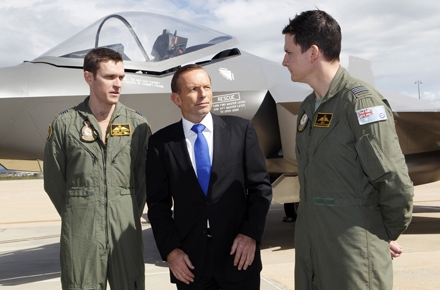Abbott should scrap two per cent defence spending
Two experts from the ANU College of Asia and the Pacific have urged Prime Minister Tony Abbott to abandon his pledge to spend two per cent of gross domestic product (GDP) on defence.
The call, from Dr Andrew Carr and Dr Peter Dean in the Strategic and Defence Studies Centre, comes ahead of the Abbott Government’s first budget next Tuesday, and ahead of a new Defence White Paper due in 2015.
Dr Dean and Dr Carr said the two per cent target seems to have emerged as part of a pre-election bidding war rather than as part of a considered budget and strategic policy.
“Maintaining the two per cent target will lead to poor public policy development and potentially wasteful spending,” Dr Carr said.
“What began as a claim that Australia was spending the same amount in GDP terms in 2012 as in 1938, has become an abstract spending target for major political parties to claim they are serious about national security.”
Dr Carr said while GDP has some uses, it can be highly misleading as a form of comparison and analysis, particularly for driving defence policy.
He said the use of a GDP funding target could lead to a false sense of security, and using GDP as a funding measurement made it difficult to compare funding from other countries.
“We don’t have any idea whether or not two per cent of GDP will be too much or too little to spend on defence over the next decade,” he said.
Dr Dean said instead of maintaining the two per cent of GDP formula, the government should focus spending on the nation’s perceived threats, objectives and level of acceptable risk. This would mean only allocating financial resources to defence as appropriate.
“A survey of the strategic environment, and Australia’s core interests and objectives within it, must remain at the centre of Australia’s public discussion of defence and national security,” Dr Dean said.
“Arbitrary targets like two per cent of GDP won’t be able to sustain long-term public support.
“The government should quietly abandon its funding-first approach to defence policy.
“It should develop a clear strategic rationale for the Australian Defence Force, do so in a manner that the public understands and supports, and then establish a consistent funding level over the medium to long term that can provide for those requirements.
“Only in this way, can Australia’s security be credibly pursued in the coming century.”
Dr Carr and Dr Dean’s position on defence spending is outlined in the latest Centre of Gravity paper – a policy series published by the Strategic and Defence Studies Centre and available online.







